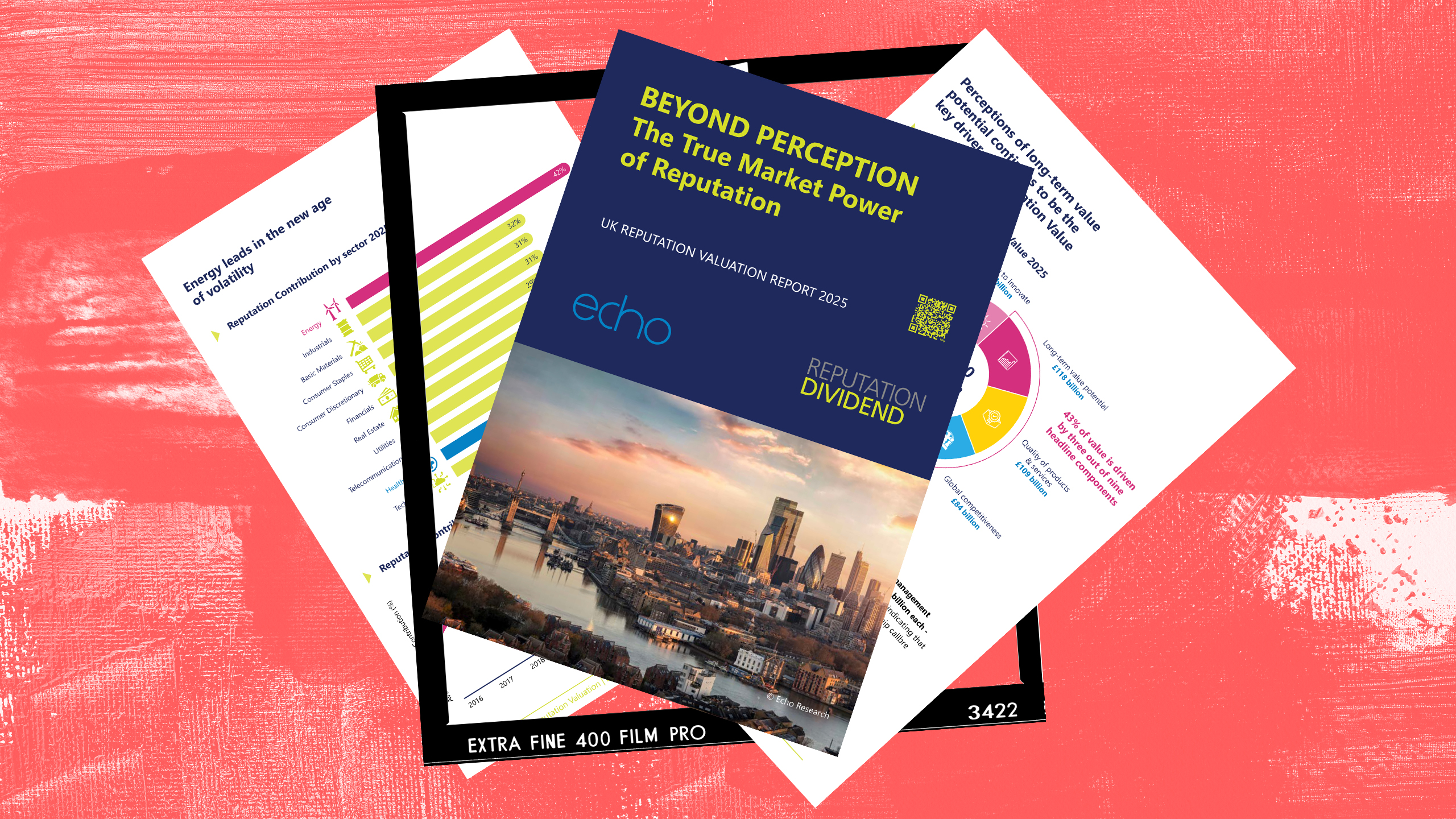Corporate reputation is a “critical financial driver” for UK companies, accounting for £730bn of the total value of the FTSE 350 companies, according to The UK Reputation Valuation Report 2025, published by Echo Research.
Reputation makes up 29 per cent of the value of the UK’s biggest firms, says the new research, which also highlights a “broadening of reputation expectations” which poses challenges for comms and corporate affairs leaders.
Meanwhile it argues that an organisation seeking to grow its reputational value should ensure that its reputation management and communications strategy prioritises both encouraging and showcasing innovation, strong people practices and financial resilience. This is based on the finding that these areas are currently relatively underweighted in terms of current realised reputational value, but have significant growth potential.
While most companies’ value is positively impacted by their reputation, it says, poor communications can also put you in the red, with 5 per cent of those companies losing a combined total of £9bn as a result of reputational damage. “These losses,” the report notes, “typically stem from perceptions of poor crisis handling, weak governance or seeming failure to align with evolving societal expectations.”
Broadening reputation expectations
The report outlines nine specific drivers of reputation value, with the biggest being long-term value potential (worth 16 per cent of 2025’s £730bn total); quality of products and services (15 per cent); global competitiveness (12 per cent) and ESG (11 per cent).
The remaining five are quality of management, financial soundness and use of corporate assets (10 per cent each), followed by people management (9 per cent) and capacity to innovate (7 per cent).
The report says that there has been substantial “volatility” in that list over the decade, with different dimensions becoming significantly more or less relevant in certain years – people management grew in importance during the pandemic years (2020 to 2022) but has since dropped off, while ESG had a significant dip in 2024 (see below).
The report says: “Where once long-term potential dominated, today’s stakeholder landscape demands proof, performance and adaptability. The rise of product quality and even ESG contributions point to a market that rewards action over aspiration, and outcomes over intentions.”
ESG bruised but (partially) hardening
The report notes that ESG’s standing as part of reputation has been volatile – in 2024 it dipped into negative territory at -1 per cent, meaning it caused reputational damage overall.
The report says that this dip was “likely driven by growing scepticism, accusations of greenwashing, ESG fatigue, and political pushback”, and its return to prominence in 2025 “suggests a market reappraisal of ESG’s true value, particularly when underpinned by tangible, transparent action, transformation and impact – notably de-risking the business, saving costs and/or driving value in the process”.
It also notes divergence within the three ESG components. While the ‘E’ (environmental) is “increasingly measurable, regulated and investor critical, with momentum that appears unstoppable”, the Social and Governance elements “can be more easily rolled back”. The report adds: “The term ’ESG’ may be bruised, but the underlying expectations, especially around the ‘E’, are hardening.”
Sector and transatlantic comparisons
By some margin, the sector making the most of its reputation is energy. Echo Research calculates that reputation accounts for 42 per cent of the value of FTSE 350 energy players, ahead of industrials (32 per cent), basic materials (31 per cent) and consumer staples (31 per cent). The sectors with least reputational value are technology (11 per cent) and healthcare (16 per cent).
The individual company with the greatest reputational value as a percentage of its total value is Shell, with 51 per cent. The top five is completed by BP and RioTinto (both 47 per cent), Tesco (46 per cent) and BAE Systems (45 per cent).
The report also highlights three companies showing major growth between 2024 and 2025 – Rolls-Royce added £13.4bn to its reputational value, highlighting “how a strategic reputation rebound linked to delivering on its major restructuring programme can drive greater resilience and market confidence”. ITV and Hammerson (both of which achieved smaller gross gains, albeit larger in percentage terms “signal effective brand repositioning and/or crisis recovery, particularly amid shifting consumer or investor expectations”.
In addition, it makes transatlantic comparisons, showing that firms in the S&P500 have a slightly lower reputation contribution to their value (26 per cent) than their UK counterparts.
In both the UK and US long-term value potential is the most sizeable dimension of reputational value. But while product quality and global competitiveness are second and third in the UK, in the US these are lower priorities – numbers two and three are instead the financial and people dimensions.

